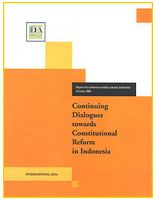Customary Governance and Democracy Building: Exploring the Linkages, International IDEA - 2011
How to best address the role of customary governance structures in a variety of current and potential future democracy-building contexts was the core question at the conference, jointly organized by the United Nations Economic Commission for Africa (UNECA) and International IDEA, in Addis Ababa, Ethiopia in September 2011.
In many contexts ‘formal’ and ‘informal’ governance structures cannot easily be separated. Participants at this conference recognized the need to develop an approach to democracy building that seeks to match and combine these seemingly parallel systems of governance while formulating effective ways of dealing with instances where they diverge.
In addition, the importance of ‘customizing the democratic’—and at the same time ‘democratizing the customary’—is essential if democracy is to be considered truly legitimate by the world’s populations. A key conclusion of the discussions was recognizing and paying attention to contextual specificity; regional, national or local.
The conference brought together 70 experts from around the world, to develop a comparative analysis of the role and functioning of customary governance structures, promoting better informed and more effective democracy-building efforts.
You can read this publication or download it from the link below:
http://www.idea.int/publications/customary-governance/index.cfm
Table of Contents
Introduction
Acknowledgements
Acronyms and abbreviations
Conference Introduction and Opening Remarks
Dr Kojo Busia, Dr Peter deSouza and Mark Salter
Session 1: African Perspectives
Why Democracy Building in Africa Might Require Reconciling Modern and Traditional Institutions of Governance, Professor Kidane Mengisteab
The Roots of Resilience: Exploring Popular Support for African Traditional Authorities,Professor Carolyn Logan
Session 2: Rooting Governance in African Realities
Rooting Governance in African Realities: Are Customary Institutions the Answer?
Frederick Golooba-Mutebi
Session 3: The Role of Traditional Governance Institutions in Promoting
Democracy and Managing Internal Conflict: The Case of Botswana
Customary Governance and Democracy Building: The Case of Botswana, Dr Patrick Molutsi
Session 4: The Role of Customary and Elected Authorities in Local Service Delivery: An Indian Case Study
The Role of Customary and Elected Authorities in Local Service Delivery: The Case of Karnataka State, India, Professor Kripa Ananthpur
Session 5: Customary Governance and Democracy Building: Perspectives from the Andean Region
Latin America: New Political Actors, New Democracy and New States: The Role of Indigenous Peoples in the Refounding of the State, Professor Guillermo Padilla Rubiano
Constitutional Recognition of Indigenous Customary Law in Latin America: From Multiculturalism to Plurinational States—Trends and Challenges, Doctor Raquel Yrigoyen Fajardo
Session 6: Customary Governance and Democracy Building: An Overview from the Arab World
Democracy Between Political Power and Customary Governance in the Arab Region,Gihan Abouzeid
Session 7: Lessons Learned for the International Community
Doctor Tanja Chopra
Concluding Session: Key Issues Identified and Critical Areas Requiring Further Investigation
Annex 1: Conference agenda
Annex 2: List of participants
